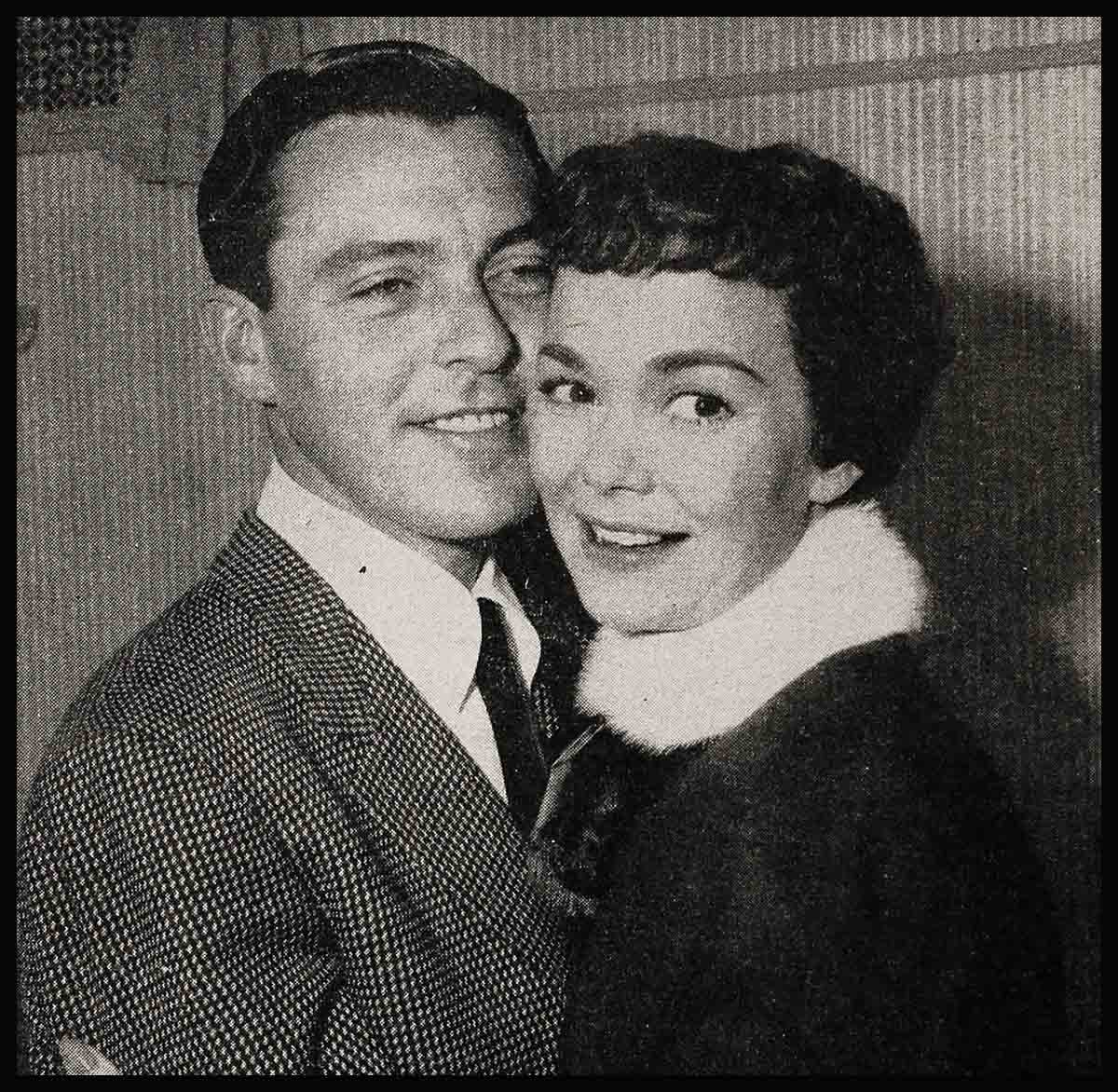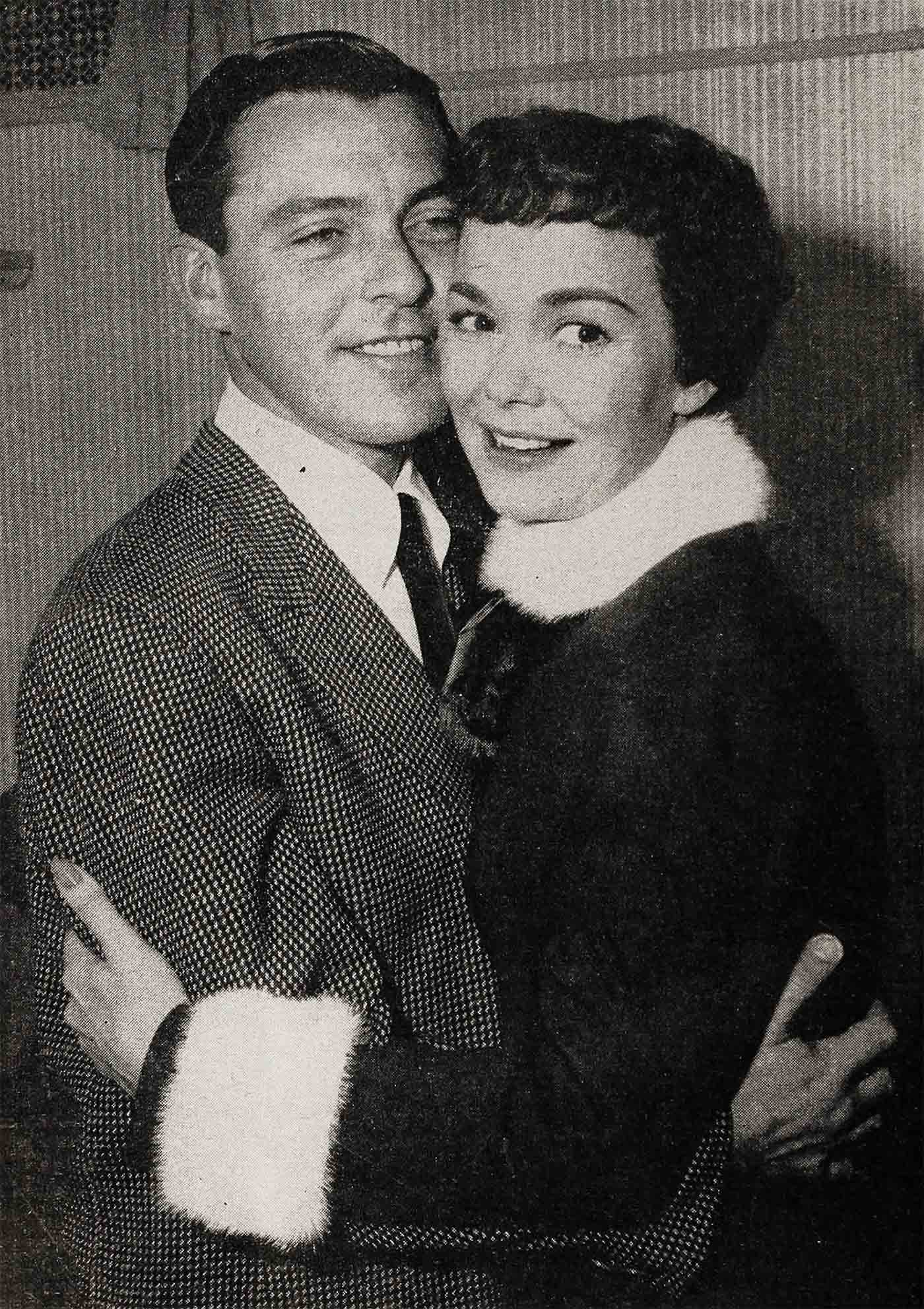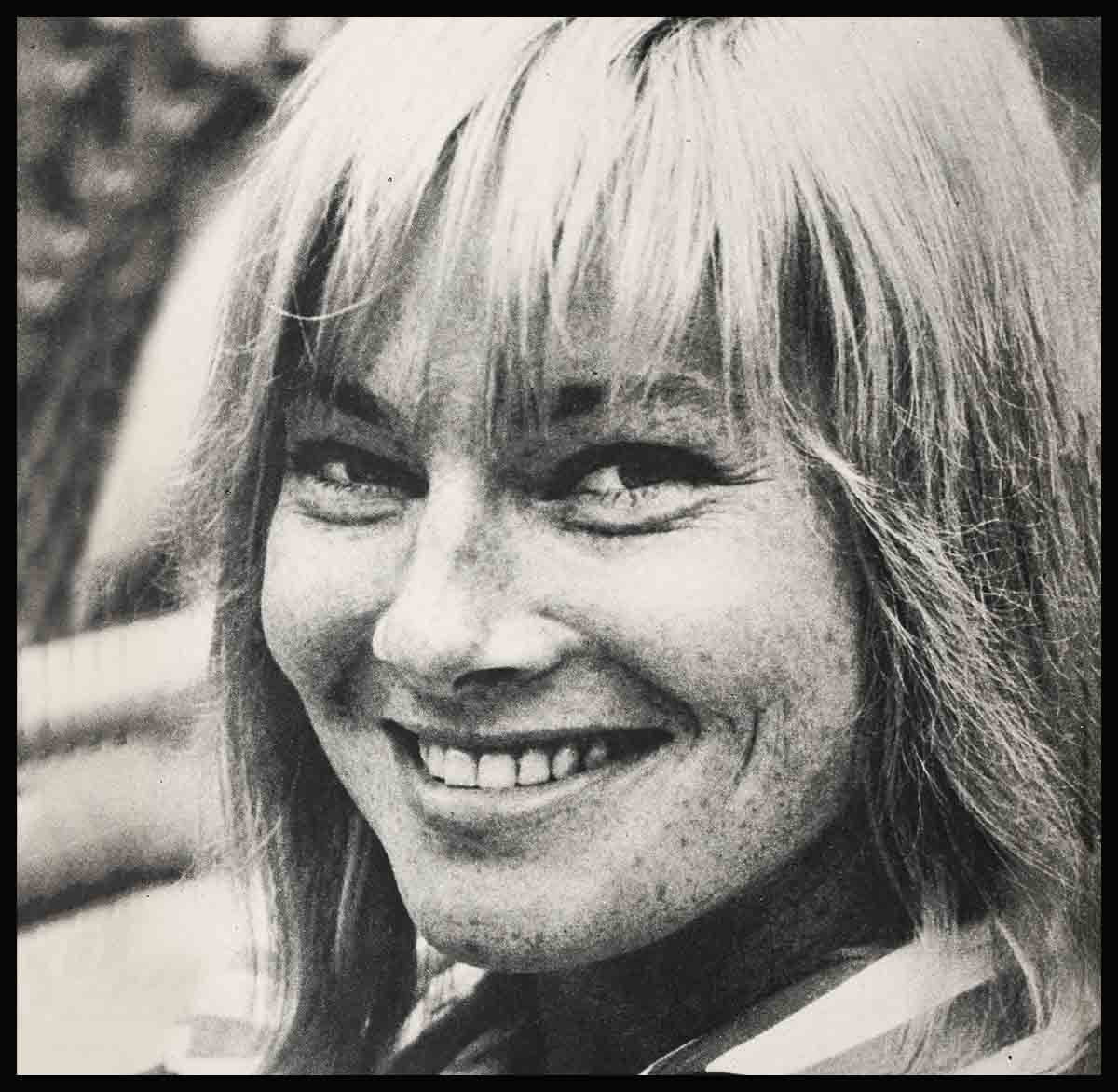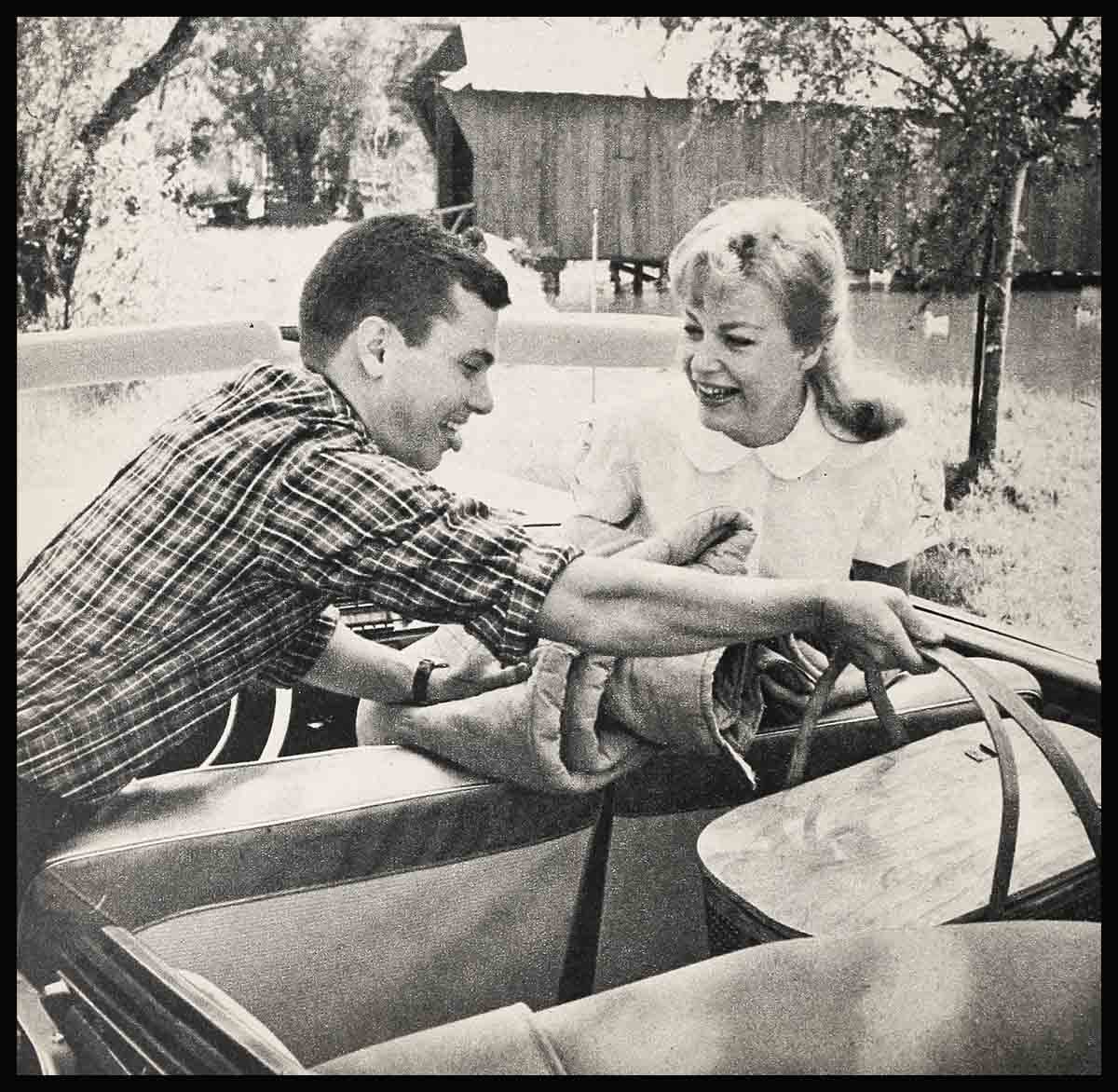
Through With Love?—Jane Wyman
On January 4, Jane Wyman celebrated her fortieth birthday in what seemed to be matrimonial harmony.
On January 5, Louella Parsons reported that Jane and husband Freddie Karger had separated and that Jane had instructed her attorney to file for divorce.
Since Miss Wyman took home her Oscar in 1948 her private life, which was once free and open, has become almost cloistered as far as her public is concerned. It has become, in fact, her private life. Her marriage to musician Karger in November, 1952, took everyone by surprise and her decision fourteen months later to call the whole thing off was equally surprising. During their marriage Jane and Freddie had been hand holders. That tends to discourage gossips from hints of rifting. If two people hold hands all the time, says Hollywood, they must be in love.
And Jane and Freddie did hold hands. They held hands while they looked at houses for sale, they held hands at cocktail parties and they held hands when Freddie visited Jane on the set. They were a charming couple. Hedda Hopper said this was a popular union and the next day she received a note from the Kargers. “Happiness is difficult to find, and having found it, it is our turn to say best wishes and thank you.”
Late in 1953 Hopper had something else to say. “The marriage of Jane Wyman has hit the rocks. Freddie, who has moved into his mother’s home, verified the situation but said, ‘Please, no comment.’ Jane Wyman does not answer her phone.”
On December 7, Louella reported their reconciliation. “Jane and Freddie have kissed and made up and I told them they were equally to blame. There were a few problems, but not important ones. It looks as if everything will be all right because they were holding hands when they left.”
There it was again—hand holding. It fooled everybody except Jane’s closest friends. They know her too well to be duped by a gesture. During the Christmas holidays she was as nervous as a cat in a cage. When her son Mike accidentally set the dining room on fire it was several days before Wyman got her feet back on the ground. Admittedly, a fire in the home is enough to upset anybody, but Jane was out when it happened and the fire was out by the time she got home. An exquisite table was damaged beyond repair and the ceiling was blackened. Mike was duly penitent, having only lighted the candles of a centerpiece to show the maid how pretty it was. There was no reason, under normal circumstances, for more emotion than downright remorse for the table. But Jane blew sky high and friends noted that she shook like a leaf at the slightest disturbance all through the holidays. There was even a rumor of a second blow up with Karger but if that was fact, it was kept from the press.
It came to a head just after the start of the new year. Jane arranged to file for divorce, charging grievous mental suffering, and Freddie took his own action, filing for legal separation, to be followed by suit for divorce, charging mental cruelty.
“What’s the matter?” Louella wanted to know.
“The same old thing. You know,” replied Miss Wyman. “We just weren’t able to work out a reconciliation. However, believe me, we parted very amicably. We both realized our problems couldn’t be solved so we decided to go through with the divorce.”
“Any chance of making up?” inquired Miss Parsons.
“Absolutely not,” said Miss Wyman. The way she said it left no doubt.
Said Mr. Karger, “I don’t want to say anything. I’d rather Jane made all statements. Anything she says is all right with me.”
All of this conversation left unanswered the big question in any Hollywood divorce. Why?
Part of the answer might be found in a list of names by which Jane Wyman has been known in the past: Sarah Jane Fulks. Jane Durrell. Jane Wyman. Jane Futterman. Jane Reagan. Jane Karger. With this new divorce, she is asking to resume the legal name of Jane Wyman.
Obviously, this list shows a restless nature. She was born Sarah Jane Fulks but the rest of the names were taken on voluntarily. She called herself Jane Durrell when she came to Hollywood twenty years ago. Eventually, she became Jane Wyman. Some say the Wyman was acquired through an early marriage, but Jane has The next, with Myron Futterman, ended with divorce in 1938 when Jane was twenty-four years old. She refuses to discuss this marriage or the one rumored to have taken place when she was in her teens. Two years after her divorce from Myron Futterman and a stormy romance with Tyrone Power, Jane married Ronald Reagan. Although this Was a marriage blessed with a home and children and regular church attendance—all the things the books say will make a lasting marriage—it, too, came to an end after eight years.

Then came a four-year stretch in which Hollywood said it was worried about Wyman. She wasn’t showing any signs of wanting to marry again, and Wyman, they said, was a girl who has to be married in order to be happy. There was a fiasco with a young man named Travis Kleefeld, a boy whose family had enough money to permit their son to play the Hollywood field. ‘Trav’ and Jane dated steadily and nightly and after an acquaintance of ten weeks became engaged. Three weeks later, when they became un-engaged, Jane explained the betrothal. Pressure from friends and from the press had led her to think a marriage with Kleefeld would be advisable. Those same pressures had influenced her to break her engagement.
This is a strange statement from a woman who takes marriage seriously. Such an attitude could not possibly stem from reason; it must necessarily have been emotional. There are those who insist that Jane’s near-tumble into another mistake was the result of a rebound from Greg Bautzer. Mr. Bautzer is the man-about-town lawyer who has squired practically every glamour girl you can name, but married none of them. Each new fancy thinks she will be the one to land him, and each new fancy eventually learns the awful truth; i.e., Mr. Bautzer is not about to marry anybody.
With all this going on, small wonder Jane’s friends worried about her. Most of them, along with all of Hollywood, were stunned by the restless Miss Wyman’s marriage to Karger. Not that anyone disapproved. It was the suddenness of it. She had known him three months. She had rehearsed with him her musical numbers for Let’s Do It Again. Fred Karger is an able musician, employed as a musical supervisor by Columbia Pictures when there is a musical film in the making. He comes from a family in comfortable circumstances. His father was a businessman; his mother had been in vaudeville. He and Jane seemed to have a great deal in common, and this time she didn’t consult anybody. “When you’re going to get married,” she said, “you don’t need opinions. You have your own.” And so they went to Santa Barbara to be married, with Freddie’s friend, Dick Quine, and Jane’s hairdresser, Betty Lou Fredericks, as witnesses.
The marriage had a good chance. Both Jane and Freddie were very much in love. Both of them are thoroughly nice people. Jane’s two children, Maureen and Mike, got along famously with Terry Karger, Freddie’s daughter by his only previous marriage. Said the new Mrs. Karger: “It must have been a kind of providence that brought Freddie and me together. He not only thinks the way I do, I find myself agreeing with him as soon as we begin to discuss something.” She was objective enough to refuse to live in the house she had shared with Ronnie. Following the breakup with Kleefeld she had said, “I would certainly never subject a new marriage to the pressure of living against an old background. You know how that can ruin things. I began to wonder where we would live—” With Karger there was no hesitation. They rented a house on Beverly Glen Boulevard. It was big enough to hold their collection of pianos (three) and children (three).
Their careers went booming along. Jane made So Big the following summer and Magnificent Obsession the following fall. Freddie was out of Columbia with the finish of Let’s Do It Again but back to write the theme song for From Here To Eternity and back again at the end of the year for The Pleasure’s All Mine. Between picture assignments he had his orchestra, a band much in demand for private parties.
The marriage should have gone along swimmingly. Instead, within the space of one year, something went terribly wrong.
At first there had been a tremendous physical attraction. If that were the sole basis of their love it would naturally lead to trouble. When attraction wanes the problems seem bigger than they do in the first flush of a marriage. Jane herself has said, “I’m madly impulsive. I do things and then I think, ‘What did I do?’ When I have that doubt I must pause and get things straightened out.”
Did Karger’s health have anything to do with it? It is said that his doctor has warned him against strenuous physical exertion because of his heart. Did this mean any loss of activity for Jane, who loves activity? After her marriage she said, “I’d like the chance to travel now. I’ve been too busy up to now.” Instead they stayed home, pinned down to her work or his, and somewhat confined because of his health.
Was the financial situation too difficult to bear? In his capacity of musical supervisor, on and off, Karger’s income did not nearly measure up to the sums brought in by his wife. There must have been the old Hollywood bugaboo of the husband who ran second as a breadwinner. The man whose wife receives a jeweled bangle as a Christmas gift from her agent, while the best he can afford is a nightgown, must always be in a difficult position.
The Kargers were on an eternal house hunt but they never bought a house. While house hunting one day the Kargers looked at a mansion priced at $96,000 and Mr. Karger said, “Now, this is one I can afford.” This leads to speculation about Karger’s attitude and income, and whose money the Kargers were living on.
It must be remembered that it is hard for any man to be married to a woman so prominent that he himself must be self-effacing. To be Mr. Wyman is no fun. It was embarrassing when the Kargers were invited to a party and Freddie Karger’s band was invited to play for the same occasion. It happened several times and Karger had to turn down the job. This meant less income provided by him.
You will recall that Jane told Louella Parsons, “Believe me, we parted very amicably.” ‘Believe me’ has the sound of a plea and suggests that the lady doth protest too much. It could not have been so very amicable when both parties, within the space of a few days, filed for divorce from each other.
Freddie Karger is, above all, a gentleman, and a gentleman does not file for divorce unless he is very, very angry, or unless he is a publicity hound. Karger is far from being a publicity hound. He has always been the kind of man who shrinks from the glare of the spotlight. So it must be assumed that Mr. Karger had reason to be angry.
A lawyer who handles many Hollywood divorces has said, “Whenever two people file simultaneously for a divorce, it’s a sure bet their respective attorneys have had a finger on the failing pulse of the marriage. They know it is spoiling for a fight and when the moment comes for it to break into the open it becomes a race to see who can file first.”
Karger’s lawyer, Milton Cohen, said: “There will be no fight. All Mr. Karger is interested in is his freedom.”
It would appear that Freddie Karger is a proud man who wants to live again in a house that belongs to him, that he is a man who believes in an old-fashioned marriage. And that Jane Wyman is a proud woman who is not going to give in to circumstances, a woman who admires a modern marriage. It is possible that she realizes that sooner or later such a marriage would reduce Karger to a man without self-respect. Perhaps, in a way, the divorce will be the best thing for both of them.
Karger might have had a better chance if he could have married Sara Jane Fulks. Jane Wyman has changed a great deal since her initiation into Hollywood. In the early days she was a bouncing blonde known by everyone from the gatemen on up. She was in love with life, merry and unspoiled by success. She wanted desperately to do a dramatic part rather than the chorus cutie bits that were handed her, and when she got her first crack at it, in Johnny Belinda, she walked away with an Oscar. They say this did something to her. She became inaccessible, aloof, and suddenly high-strung. In short, Jane Wyman fell victim to what ails most of its stars. She had so much that there was little left for her to want.
This sort of thing lies coiled behind almost every Hollywood divorce. Divorces here are asked for and granted on the same grounds as in the rest of the country; adultery, alcoholism, mental cruelty, etc. But in Hollywood there is something else, something that doesn’t go into court records. Many of the plaintiffs aren’t aware of it themselves. It is a restlessness that underlies the lives of stars, an unhealthy restlessness that comes when there is nothing left to want. It comes, too, because a star is accustomed to having every wish granted, and when a mate refuses to agree with him or her, the star blows a gasket. When you are a movie star there is less inclination, to buckle down to working out disagreements than there is when you are a housewife dependent on your husband’s weekly take-home pay.
Hollywood feels sorry for both Freddie and Jane. It was a good try, but it failed. Like every divorce, in its wake lie a lot of bitter memories, as well as the sweet ones that are even harder to bear.
We wish Freddie good luck. And we hope that Jane is not yet through with love, that she will find what she is looking for.
THE END
—BY JACK WADE
It is a quote. MODERN SCREEN MAGAZINE APRIL 1954





No Comments